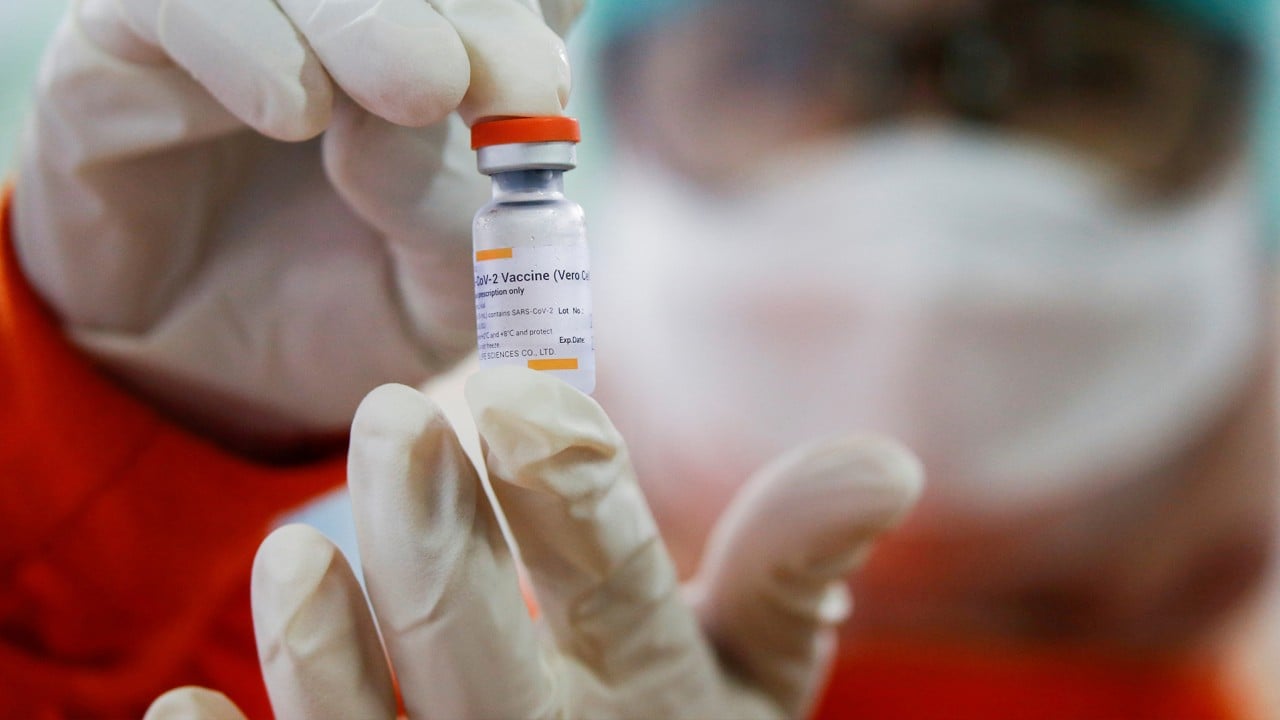
Coronavirus: Hong Kong approves use of BioNTech vaccine for children as young as 12 years old
- Details of vaccination arrangements will be announced early next week after health secretary Sophia Chan officially approves move
- Nearly 60 per cent of Hongkongers support the mandatory vaccination of police officers, firefighters and other frontline workers, survey finds
Details of vaccination arrangements would be announced early next week after Secretary for Food and Health Sophia Chan Siu-chee officially approved the move on Thursday.
“[The health minister] considered that the benefits of lowering the age limit for receiving the Comirnaty vaccine outweigh the risks,” the Food and Health Bureau said in a statement, using the jab’s brand name. “Not only can it protect adolescents from Covid-19 infection, it can also enable them to resume normal school and daily life as soon as possible.”

01:30
WHO approves Sinovac Biotech’s coronavirus vaccine for emergency use
The expansion of the government’s vaccination drive meant that around 243,500 youngsters aged 12 to 15 would be eligible for the shots.
On Monday, the government revealed it would explore the idea of barring unvaccinated people from entering some high-risk premises such as schools and restaurants when the fifth wave hits.
The Democratic Party has urged schools to respect parents and students, and not to force students to take vaccines against their wishes. Zoe Chow Wing-heng, the party’s spokesman for education affairs, said on Thursday that officials should explain the possible risks and offer free body check-ups for students before they get the jabs.
Education authorities revealed that around 18 per cent of teachers and staff of some 2,000 kindergartens and schools were fully vaccinated or planning to take the first dose.
HK$10.8 million flat lottery for Covid-19 jabs in Hong Kong opens on June 15
The latest development on jabs came as Hong Kong confirmed just one new coronavirus case, an imported infection.
The case involved a 37-year-old domestic helper who arrived from Indonesia, bringing the city’s confirmed total to 11,849, with 210 related deaths. Fewer than five people tested preliminary-positive.
Releasing the findings on Thursday, university researchers also urged the government to offer a wide range of incentives to encourage people to take jabs, as only a quarter of unvaccinated survey respondents said they were planning to get the shots in the coming six months.
“We are a bit worried the vaccination rate will be consistently low in the future,” department of microbiology chairman Professor Paul Chan Kay-sheung told a press conference.
“Each incentive could attract a small number of people, and only by adopting different incentives together can the vaccination rate be pushed up.”
Since the launch of the vaccination programme in late February, take-up has been slow. About 1.44 million people, or 19.2 per cent of the city’s 7.5 million population, had received their first vaccine dose. Around 1.06 million of them had taken their second shot.
The survey interviewed 1,202 Hongkongers aged 18 or older between April 23 and May 8. Of those, 913 had not yet been vaccinated.
It found that 59.3 per cent of all respondents supported mandatory vaccination for people providing essential public services, such as police officers and firefighters.
Hong Kong urged to exempt more from quarantine as helpers claim discrimination
About half of all interviewees also agreed with introducing the compulsory measure for foreign domestic helpers, staff at health care institutions, and people working in the service industry.
But fewer people supported imposing the requirement on teachers, with only 41.7 per cent endorsing that approach.
“Based on the survey findings, we supported the government or some organisations to think along this direction,” Chan said, adding there should not be a blanket approach to mandatory vaccination and incentives should be offered to jab recipients.
Among the some 684 interviewees – or around 75 per cent of the unvaccinated group – who have not made any plans to get vaccinated, vaccine passports allowing more convenient travel was the most popular among measures for encouraging people to take the jabs. However, the number remained low, scoring just 4.4 out of 10.
According to the survey, travel convenience was more persuasive than being offered leave for receiving the shots, securing permission to enter leisure and entertainment venues, and relaxations of quarantine arrangements.
About 70 per cent of respondents also opposed the government handing out cash to encourage vaccination.
Coronavirus: could Hong Kong’s approach to enticing vaccination backfire?
Professor Martin Wong Chi-sang, from the university’s school of public health, said he believed that sentiment was based on Hongkongers’ disapproval of using public money for such purposes. But incentives offered by the business sector, announced after the survey was carried out, might still have some impact, Wong suggested.
“Lucky draws and shopping coupons as provided by commercial sectors, not from public money, may probably have a very different effect,” Wong said.

